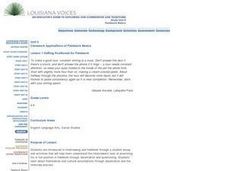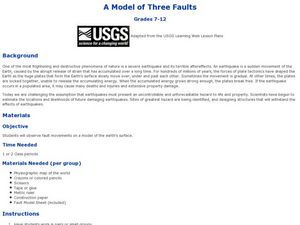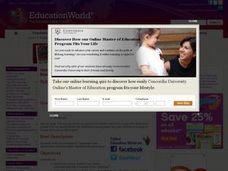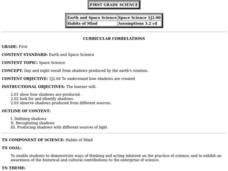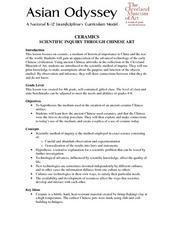Code.org
Check Your Assumptions
Always check your assumptions when interpreting data and data visualizations. That's the take away from this exercise. Class members examine a failed project that looks at search trends to predict flu outbreaks and consider the...
Curated OER
What Can We Learn From the Past?
What would future archeologists learn from your scholars' personal belongings? Have them bring in a box of "primary sources" from their home. Discuss the difference between observations and inference, using some of your own items to...
Curated OER
Observations and Inferences
Learners observe how to distinguish observations form inferences. For this examining inferences lesson students list observations relating to the activity and discuss the importance of them.
Curated OER
Observing To Make Meaning
Students infer meaning while viewing a scene of Pinocchio without sound. They write a plot summary of the excerpt of Pinocchio, watch the same scene with sound, and compare their assumptions with the actual performance.
Curated OER
Lesson 12: What Reasonable Conclusions are Possible?
Oftentimes, we jump to conclusions when we are given a limited amount of information. Take a look at reasonable conclusions with your communications studies class. If-clauses, dichotomous thinking, and assumptions are all covered with...
Curated OER
Artifact Identification-What is it?
Students observe an artifact and make an inference about the artifact's purpose. They are going to role-play as archaeologists by using artifacts to hypothesize about the lives of past people.
Curated OER
GROWING PLANTS UNIT
Students predict outcomes of scientific experiment,.conduct a scientific experiment with control groups, and plant seeds to observe, measure, and compare growth across groups. They gather, record, analyze, and share data with other...
Curated OER
Getting Positioned for Fieldwork
Students examine interviewing and fieldwork through a student essay and activities that help them understand the interviewer's task of examining his or her position in fieldwork through observation and questioning. They explore cultural...
Curated OER
Conducting a Functional Behavior Assessment
This is an excellent guideline for an observer to use when conducting an assessment for a student who has a chronic behavior problem. The chart has 3 categories--antecedent, behavior, consequences--and clear examples to guide you.
NASA
Discovering Some of Your “Yardsticks” Are Actually “Meter-sticks”
The Milky Way gets great reviews on Trip Advisor — 100 million stars. The activity allows scholars to rethink their assumptions and prior knowledge. Pupils observe a set of two lights at equal distance and brightness, but they believe...
Curated OER
A Model of Three Faults
Students observe fault movements on model of the Earth's surface, find fault movements associated with different types of plate boundaries, research examples of non-plate boundary faults, and research and report on the types of faults...
Curated OER
First Impressions
Pupils discuss the importance of not making assumptions when only little information is known. With a partner, they complete a worksheet in which they only look at them to figure out what they like, etc. Next, they ask them the...
Curated OER
Outgroup Experiment Reveals Bias, Stereotyping
Exploring bias and stereotypes, students dress up as members of "outgroups" (groups of people who are often judged). Though the lesson specifies that it should be "respectful and not mock the outgroup in any way," this activity would be...
Curated OER
Cultural Issues
Students observe another culture using a provided simulation script and then make assumptions about that culture based on what they witnessed. They will later be debriefed and talk about the assumptions they made that were not accurate.
Curated OER
What is a Gas?
Students develop a scientific model of gas behavior. In this gas lesson plan, students observe different balloons filled with different densities of gases. They complete an activity where they model the behavior of gases using marbles, a...
Curated OER
The Role of Enzymes
Young scholars explore the role of enzymes in chemical reactions. In this enzymes lesson plan, students use hydrogen peroxide and manganese dioxide to observe a chemical reaction. Young scholars observe the rates of reactions of chalk,...
Curated OER
Chemistry Lab: Chemical Equilibrium
Students investigate the effects of adding or removing a reactant or a product on chemical equilibrium. In this equilibrium lesson plan, students add or remove ions to solutions to determine the effects on equilibrium. They make...
Curated OER
Can Girls Be Plumbers? And Other Gender Stereotypes
Learners realize the effects of stereotypes by collaboratively creating a chart with the rest of their class. In this equality instructional activity, students demonstrate stereotypes by collaborating on a jobs chart and matching...
Mathematics Vision Project
Geometric Figures
Logical thinking is at the forefront of this jam-packed lesson, with young mathematicians not only investigating geometric concepts but also how they "know what they know". Through each activity and worksheet, learners wrestle with...
Curated OER
Day and Night
First graders study that day and night result from shadows produced by Earth's rotation. Students work to show how shadows are produced, look for and identify shadows and observe shadows produced from different sources.
Curated OER
Ceramics Scientific Inquiry Through Chinese Art
Fourth graders explore, examine and study ceramics, a medium of historical importance to China. They review the advanced technology of the early Chinese civilization and are introduced to the scientific method of inquiry and make...
Curated OER
Women and the Civil War Era
Students explore feminism and explore the different roles of women and how they have changed over time. They read books about women in this period and evaluate the past, observe the present, and make assumptions about the future.
Curated OER
The 'Solar' System Past and Present
Students identify cardinal and intermediate directions, recognize that models changes due to new or improved observations and technology, identify the major characteristics of the planets including their positions in the solar system,...
Curated OER
Collecting and Recording Data# O
Students observe plants growing over time, measure specific plant growth, and gather and record data on plan growth.









